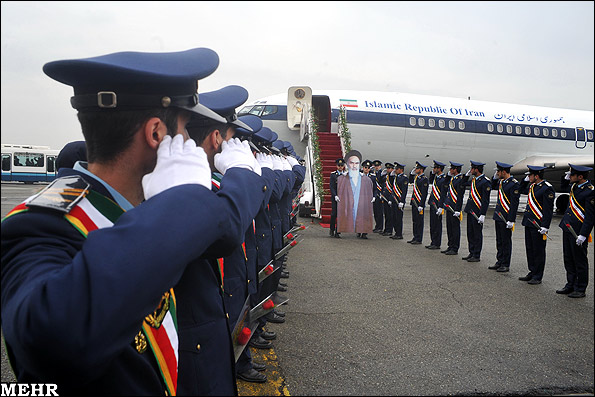UPDATES
Iran’s blundering revolution celebrations and waning Arab support
February 3, 2012 | Daniel Meyerowitz-Katz

Wednesday was the 33rd anniversary of the return from exile of Iran’s then-revolutionary leader Ayatollah Ruhollah Khomeini. In celebration, the Iranian regime chose to stage a reenactment of the triumphant moment, with the Iranian airforce marching a larger than life cutout of the Ayatollah off an airplane in an elaborate parade.
Photographs of the event were made available on the semi-official Mehr news agency and have since created an Iranian viral sensation. David Goodman has reported the response on New York Times blog The Lede:

The Twitter account for the English-language Iranian blog Pedestrian was characteristic of the reaction:
Haven’t laughed this hard in SO long. Iranian blogistan is on comedy fire with the cardboard Imam:baztab.net/fa/news/1787/%… #Iran #Khomeini
– Sidewalk Lyrics (@pedestrian) February 1, 2012The anonymous creator of Cardboard Khomeini has taken part of one of the photographs, the ayatollah’s oversize likeness being carried by two security officers in sunglasses, and pasted it into a variety of iconic images like the Beatles “Abbey Road” album cover, the moon landing and Ronald Reagan’s 1980 inauguration.
The highly-amusing Cardboard Khomeini blog that Goodman mentions, whose creator describes him/herself as “nothing but a humble admirer who is fascinated by this cardboard cutout’s omnipresence”, has some very funny images that also serve as biting satire of the Iranian regime’s often comical distortions of world events.

Meanwhile, the cardboard Khomeini is not the only way in which Iran has made itself a laughing stock this week. Also in The New York Times, Robert Worth has reported on a conference that the Iranian regime held for activists involved in the Arab Spring. As he notes, however, glaringly absent from the conference floor was any representation from the Syrian opposition.
TEHRAN – It was meant to be a crowning moment in which Iran put its own Islamic stamp on the Arab Spring. More than a thousand young activists were flown here earlier this week (at government expense) for a conference on “the Islamic Awakening,” Tehran’s effort to rebrand the popular Arab uprisings of the past year.
…But there was a catch. No one was invited from Syria, whose autocratic president, Bashar al-Assad, is a crucial Iranian ally. The Syrian protesters are routinely dismissed by Tehran’s government as foreign agents – despite the fact that they are Muslims fighting a secular (and brutal) dictatorship.
That inconvenient truth soon marred the whole script. As the conference began, a young man in the audience held up a sign with the word “SYRIA?” written in English. Applause burst out in the crowd, followed by boos. Audience members began chanting the slogan of the Syrian protesters: “God, freedom and Syria!” But they were drowned out by others chanting pro-Assad slogans.
Worth also points out the rather questionable benchmark by which the Iranian rulers measure whether a revolution is “real” or a “conspiracy” like the one in Syria.
… During a news conference with Ali Akbar Velayati, an adviser to Iran’s supreme leader, Ayatollah Ali Khamenei, a Jordanian reporter asked how to tell a real revolution from a foreign conspiracy, in a tone that seemed almost tongue in cheek.
“Good question,” Mr. Velayati said. The answer was simple: “One of them favors the United States and the Zionists, and the other is against it.”
Of course, the Iranians do not actually use the test that Velayati articulated. There is no cause to believe that the largely Muslim Brotherhood dominated Syrian opposition is particularly pro-US or pro-Israel, whereas the Libyan opposition is openly indebted to the US for the help given during the military intervention.
Despite generally jumping at the chance to attend the all-expense-paid junket, it comes as little surprise that the activists generally saw straight through Iran’s attempts to claim the Arab revolutions as its own. As Colin Khal has noted in Foreign Policy, Iran has been attempting to claim credit from the beginning and has consistently been rejected. In fact, as the dust slowly settles in the Arab world, it is becoming increasingly apparent that Iran did not come out on top.
One year ago today, Egyptians took to the streets to demand the removal of Hosni Mubarak’s three-decade-old dictatorship. As they waved flags and chanted for the fall of the regime, another ruler 1,200 miles to the east was calculating how to use their act of courage for his own profit. On Feb. 4, at the height of the protests in Tahrir Square, Iran’s Supreme Leader Ayatollah Ali Khamenei took the stage in Tehran to deliver his assessment of the revolutionary moment unfolding in Cairo.
Speaking partly in Arabic, Khamenei described events in Egypt as an “Islamic awakening” inspired by Iran’s own 1979 revolution. The speech was blasted out to thousands of Egyptians via text message, and Khamenei even claimed on his webpage to have personally inspired the pro-democracy demonstrations, comparing them to “the yell that the Iranian nation let out against America and against global arrogance and tyranny.” … but even at the time, Khamenei’s assertions fell on deaf ears among the hundreds of thousands risking their lives in Tahrir Square. When asked about Khamenei’s boastful claims, one Tahrir protester mocked: “Egyptians were not inspired by Iran. Rather, the Egyptian people are inspiring the world.”
…This is not just a temporary setback for Iran, but a sea change that could deeply undermine its regional ambitions. To be sure, the trajectory of the Arab Spring remains uncertain, and rising sectarian tensions and political backsliding in some countries may provide opportunities for Tehran to cause mischief. But several underlying dynamics suggest that Iran’s struggles will continue … As Arab publics increasingly look to their own governments to represent their interests, Iran’s ability to leverage regional discontent to influence the Arab street will continue to wane.
Daniel Meyerowitz-Katz
Tags: Egypt





